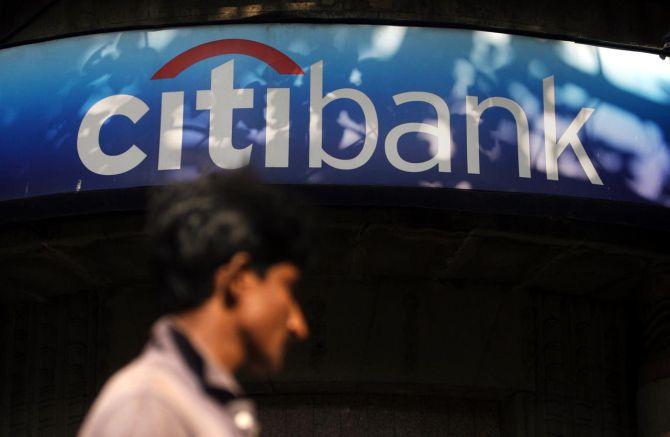The quality of customers it acquires holds the key to success but the benefits of the buyout could kick in only from FY25.
Manojit Saha and Subrata Panda report.

Axis Bank’s acquisition of Citibank’s consumer finance business for Rs 12,325 crore — the second biggest deal in the Indian banking sector — is seen as a good deal at a good price.
The acquisition enables Axis Bank to close the gap with competition in some key segments such as credit cards.
At the same time, there are some key issues that are crucial for the deal’s success, apart from the fact that it will take some time for Axis to reap the full harvest of its investment.
First, look at what Axis gains.
The deal includes Citi’s credit cards, retail banking, wealth management and consumer loans, and also sale of the consumer business of Citi’s non-banking financial company, Citicorp Finance (India) Limited.
The deal excludes Citi’s institutional client businesses in India.
Citi’s 2.55 million credit cards (as on February 2022) will be added to Axis Bank, helping Axis narrow the gap with the second- and third-largest credit card issuers — SBI Card and ICICI Bank.
Axis-Citi combined will have little over 11 million cards, compared with SBI Card’s 13.5 million and ICICI Bank’s 12.77 million.
HDFC Bank leads the segment by some distance with 16.27 million cards.
More importantly, it is the spend per card that makes the deal more relevant for Axis.
Citi customers ’ spends per card are much higher at Rs 14,000 per month than the average card spends (Rs 12,000) in India.
Axis Bank’s average card spend is Rs 9,000.
Post-acquisition, Axis Bank’s credit card book will rise around 57 per cent to Rs 24,400 crore, making it among the top three in terms of the loan book.
According to a report by Motilal Oswal Securities, Axis Bank’s market share in outstanding cards will go up from 3.6 to 15.6 per cent while the spend per card market share will increase from 4.6 to 13.1 per cent.
“Average spends per card will rise approximately 17 per cent, indicating a higher value proposition and may strengthen its (Axis) presence in the overall market,” Motilal Oswal said.
Axis has highlighted complementarity in its own credit card business and Citi’s credit card business from a geographical focus and client category point of view.
“Citi’s credit card is mostly spread in the top eight cities of the country, while Axis’ is more widely spread.
"Furthermore, customers at Axis have been mass or mass affluent whereas those at Citi have been outright affluent,” Yes Securities said in a note.
There is complementarity in the wealth management business also.
Axis Bank’s wealth management business, which has an asset under management of Rs 2.67 trillion, will grow 42 per cent.
Citi manages wealth worth Rs 1.1 trillion.
On the liabilities side, Axis will gain a Rs 50,200-crore deposit book of which 81 per cent are low cost in nature, that is, savings and current account (Casa) deposits.
This will improve Axis Bank’s Casa ratio by 201 basis points (bps) to 47 per cent.
Axis also gains a 3,600-strong high-quality workforce and Citi’s world-class CitiPhone services.
So, what are the costs? Apart from the cash payout of Rs 12,325 crore to Citi, Axis will have to bear the integration cost, pegged at Rs 1,500 crore.
This includes Rs 1,200 crore payment to Citi for servicing customers during the transition period.
The other cost is the impact on capital.
There would be a 180-bps impact on common equity tier-I (CET1) capital on Axis Bank due to the cash payment.
There would be another 50-bps impact of CET1 due to assigning risk weights to the assets that will be transferred to Axis’ book.
“Axis Bank’s CET1 ratio will fall by 230 bps to 13 per cent due to goodwill and higher capital charge on retail assets, but it will still be well above the regulatory requirement.
"As per management, the bank would look at a capital raise (potentially at better valuations) after the Citi deal is consummated by Q4FY23, subject to regulatory approval,” Emkay Global said in a note.
Axis also said it will offer Citi depositors a higher interest rate.
Axis offers 3 per cent on savings account deposits up to Rs 50 lakh and 3.5 per cent on deposits above Rs 50 lakh.
Citi offers 2.5 per cent interest rates to all its savings account customers.
“The synergy benefits will be partially offset by additional interest outgo as Axis Bank aligns its deposit rates for Citibank customers as well.
"On overall savings deposits of Rs 366 billion (Rs 36,600 crore), an additional 50 bps would imply additional interest outgo of Rs 1.8 billion (180 crore) per year,” ICICI Securities said.
The acquisition gives Axis Bank three million Citi customers — across credit cards, wealth management and loan and deposit products.
Apart from 1.2 million retail banking customers, the wealth management business has over 40,000 affluent customers, while there are over 100 families that are private banking clients of Citibank.
The total number of customers of personal loans and other loan products are 2.2 million.
“At an acquisition cost of $1.6 billion, while the deal appears to be a bargain for Axis Bank, the value accretion from Citi’s portfolio over the medium term is contingent on a host of factors including retention of existing customers, Axis Bank’s ability to continually add customers of such profile, and its ability to up-sell and cross-sell,” analysts at HDFC Securities said.
The time that will be taken for Axis to reap the benefits of the deal, however, goes beyond FY24.
That’s because, as Axis has said, regulatory approvals are expected to take 9-12 months.
Then another 18 months is required for the transition of customers to Axis Bank.
“The only issue is the timeline here, as it is a long-drawn process.
"Any impact on ROA and ROE (return on assets and return on equity, after factoring in two years of integration costs) will be felt beyond FY25, most likely from FY26.
"So, we are four years away from seeing any visible impact on financials,” said Suresh Ganapathy of Macquarie.
Summarising the Citi deal, Amitabh Chaudhry, MD & CEO of Axis Bank, said, “The acquisition strengthens our market position, reduces gap in the key segments with peers and provides opportunity to accelerate retail business growth in a value-accretive manner post-acquisition.”
The challenge may be that Chaudhry, who has pulled off this audacious deal, doesn’t lose sleep over the next three years to ensure “Citi never sleeps” in the Axis fold.












 © 2025
© 2025